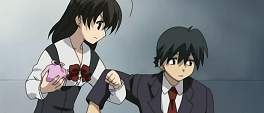



A mix of French, English and what one can only assume is Japanese in the title? It must be the school-romance genre. Kimikiss is unashamedly pedestrian in its subject matter and plants itself squarely in the mid-teen age range in both content and audience. The first three episodes do little else other than set a suitably solid foundation for future angst and trauma from the bevy of humdrum adolescents.
as unchallenging as it may be, romance aficionados may find much to get wrapped up in
Beginning inauspiciously with a returning childhood friend, a confusingly out-of-place kiss and other paraphernalia which is sure to be over-analysed as the series progresses. The characters of kimikiss, supposed to be the meat of the series, can initially be written off as typical and uninteresting; sporadically however they staunchly refuse to resort back to their obvious archetypes and plough forward giving the illusion of momentum when in fact nothing has changed. The set up of ditzy boy liking introverted girl has been recycled innumerable times before, most memorably the recent School Days, although there is little indication of murderous tendencies here; instead it is a gentle, soap-opera flow with no ideas above its station except to entertain its audience with predictable sentimentality.
Read the rest of this entry




With signature aplomb, SHAFT take up art-duties with ef - a tale of memories and craft a typically stylish and coy introduction to an intriguing and melodramatic series. Long shadows and open skies, stark lines and silhouetted profiles, the art direction obscures the sedate story and mundane characters but the potential for things much greater is too enticing to pass up.
the characters [...] are sometimes infuriatingly obtuse, communicating through enigmatic monologues or understated emotions
ef - a tale of memories pitches itself somewhere in between school drama and supernatural, School Days and Sola; it has the straight faced drama of School Days but more playful, with the fantasy hints of Sola except less blatant. The first episode can best be described as confusing: cutting back and forth between full colour, grayscale, black and white and all points in between seemingly at random then leaping forwards or backwards through time with nary a keystone to right oneself. It conjures up thoughts of Soultaker and the premise being the weirdness rather than coherence; thankfully these thoughts are allayed in the second and third episodes which deftly sculpt the story, rarely allowing itself to be pre-empted by the viewer. It doesn't so much tone-down the oddness as spread it more thinly. The abandon shown for chronology is more telling as certain characters and traits are in one arc and not the other, wordlessly foreshadowing momentous events on the horizon.
Read the rest of this entry




I'm sure like many others I was enthralled by the story that the final episode of School Days had been indefinitely postponed due to a supposedly violent ending and its likeness to a real-world killing. Not one to pass up on controversy, I queued up the series expecting it to be a fluffy, real-world version of Shuffle! or perhaps akin to Kimi ga Nozomu Eien; what I didn't expect was an unflinching, overly-dramatic portrayal of the depths of teenage decrepitude.
the series' H-game roots are only evident in the amount of sexual deviance present
The first episode of this petite twelve episode series is as mediocre and clichéd as I expected: introverted loner Makoto takes a liking to a girl he sees on the train, female best friend tries to help him get together with her while secretly having the warm-and-fuzzies for him herself. Rolling my eyes and switching off my sensibilities I began to place bets on the most promising axe-wielding female: perhaps the fun-size, silent one is actually a dark-horse in all of this. It took less than half the series to convince me that ending with violence is just one of the punches that School Days will deliver.
Read the rest of this entry











